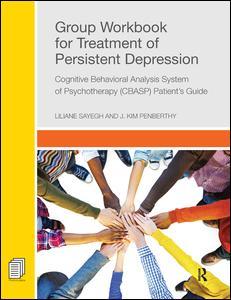Description
Group Workbook for Treatment of Persistent Depression
Cognitive Behavioral Analysis System of Psychotherapy-(CBASP) Patient’s Guide
Authors: Sayegh Liliane, Penberthy J. Kim
Language: English
Subject for Group Workbook for Treatment of Persistent Depression:
Keywords
depression; McCullough; group-CBASP; CBASP; psychotherapy; group therapy; interpersonal communication; Group Cognitive Behavioral Analysis System of Psychotherapy; DSM-V; DSM-5; mood disorders; chronic depression; Single Major Depressive Episode; outpatients; Major Depressive Disorder; Persistent Depression; Circumplex Scales; Cognitive Behavioral Analysis System; Major Depression; HDRS-24 Scores; Early Adverse Life Events; Remediation Phase; Hamilton Depression Rating Scale; Dialectic Behavior Group Therapy; Group Workbook; Persistent Depressive Disorder; Interpersonal Circumplex; Interpersonal Profile; Patient’s Guide
271.33 €
In Print (Delivery period: 14 days).
Add to cartPublication date: 06-2017
· 21x28 cm · Hardback
54.28 €
In Print (Delivery period: 14 days).
Add to cartPublication date: 04-2016
· 21x28 cm · Paperback
Description
/li>Contents
/li>Readership
/li>Biography
/li>
The Group Workbook for Treatment of Persistent Depression is a guide for patients suffering from persistent depression who participate in group therapy. The workbook provides handouts and skills training that require the help of a trained professional to teach and animate in a group format. Patients will be able to maximize their acquisition of emotion coping skills by using this book in conjunction with Group-CBASP sessions.
Forward Preface Acknowledgements Introduction
1. Group-CBASP Session 1:
• Presentation of Group Members
• CBASP Group Therapy Sessions Outline • Group Agreements
• Assessing your Current Depressive Symptoms
• Persistent versus Major Depression
• Major Depression Diagnostic Criteria
• Do you have Major Depressive Disorder?
• Do you have Persistent Depressive Disorder (Dysthymia)?
• Course Profiles for Persistent Depressive Disorders
• Two Types of Persistent Depression
• What has been the Course of your Depression?
• Depression Timeline Worksheet – Handout 1
• What has been the Cost of your Depression?
• Mood Chart – Handout 2
• Medications for Depression
• General Guidelines about Medication for Depression
2. Group-CBASP Session 2:
• The Interpersonal Domain – Handout 3
• Your Activity Log – Handout 4
• The Cycle of Depression and Inactivity
• Activities – Handout 5
• Deal with Anxiety that is Linked to Depression
3. Group-CBASP Session 3:
• How Maladaptive Thinking can Lead to Maladaptive Coping
• The Cycle of Hopelessness and Powerlessness Leads to Persistent Depression – Handouts 6 & 7
• How can we Break the Cycle? – Handout 8
• Situational Analysis (SA) (Coping Survey Questionnaire)
• Understanding Steps of the SA Within a Group Setting – Handout 9
• Example of a Situational Analysis
4. Group-CBASP Session 4:
• Remediation Phase of the Situational Analysis – Handout 10
• What is a Future Situational Analysis – Handout 11
5. Group-CBASP Session 5:
• Practicing the Situational Analysis with Elicitation and Remediation Phases
6. Group-CBASP Session 6:
• Your Interpersonal Domain – Handout 12
7. Group-CBASP Sessions 7 & 8:
• Practicing the Situational Analysis with Elicitation and Remediation Phases
8. Group-CBASP Session 9 & 10:
• Understanding our Interpersonal Interactions
• Your Interpersonal Circumplex - Values/Motives – Handout 13
• Your Interpersonal Circumplex – Efficacy – Handout 14
• Eight Styles of Interpersonal Relating – Handout 19
9. Group-CBASP Session 11 & 12:
• Your Interpersonal Circumplex –Inventory of Interpersonal Problems – Handout 15
• Understanding Extreme Scores of Interpersonal Conflict
10. Group-CBASP Session 13 & 14:
• Complementary and Non-Complementary Interactions
• Hidden Motives
11. Group-CBASP Session 15 & 16:
• Putting it all Together
• Your Interpersonal Profile – Handout 16
12. Group-CBASP Session 17 to 20:
• Prepare for Termination
1. Assess your Learning
2. Addressing Termination, Reviewing your Goals and Saying Good-Bye
13. Appendices
References Index
Liliane Sayegh, Ph.D., is a clinical psychologist specialized in mood disorders at the Douglas Mental Health University Institute, Montreal, Quebec, Canada. She is also an assistant professor in the Department of Psychology at McGill University.
J. Kim Penberthy, Ph.D., ABPP, is a board certified clinical psychologist and professor of psychiatry and neurobehavioral sciences at the University of Virginia School of Medicine. She is the Director for Research at the UVA Contemplative Sciences Center as well as the Co-Director of the Effective Communication and Coping Skills for Physicians and Physician Clinical Evaluation Programs at UVA.




